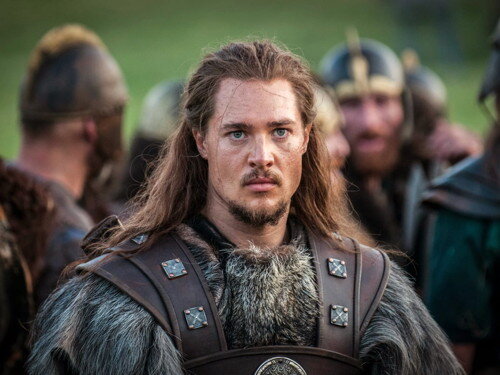The Last Kingdom: Ploughman’s Platter Recipe 🥁🥁🥁🥁🥁
/Year Released: 2015-2022
Starring: Alexander Dreymon, David Dawson, Emily McKenna Cox, Ian Hart
(R, approx. 60 min per episode0
Genre: Action and Adventure, Drama, Historical Fiction
Rousing, Gritty, Epic
“The truth of a man lies not in the land of his birth, but in his heart.” –Uhtred
This great series has it all. Brutal battle sequences, excellent character development, nuanced themes reminiscent of both Greek and Shakespearean tragedy, and of course, some pretty great romance, albeit on the graphic side.
(Short and superficial update at the end of this review.)
Pretty authentic, too. The Last Kingdom is grounded in history, even if it plays a little fast and loose with the facts. It’s certainly not as fictional as the universally loved Game of Thrones, “a medieval fantasy epic” which Different Drummer must admit that she has not seen. (HBO a luxury for now.)
Anglo-Saxons are attacked by Viking forces. Uhtred, born a Saxon but raised by Vikings, finds his loyalties tested as he tries to claim his birthright and help create a new nation.
The characters are superb. All are finely acted and delineated, and just when you are about to feel murderous (Viking-like) hate for them, they surprise you. That also goes for some of the ones you like as well.
Of course, our lead Uhtred embodies all the classic elements. He is tormented by destiny, (very Greek) but by his own tragic flaws as well (our English bard Shakespeare’s favorite), being crushed by each side as he is in the series.
His blood is Saxon. His heart is Viking. His battleground is England. Uhtred (Alexander Dreymon) is the man in the middle, the lynchpin character of all that is The Last Kingdom. Born a Saxon but raised a Dane, Uhtred realizes that his bloodline represents the future of his war-torn country. Caught between the needs of the pious Saxon king Alfred (David Dawson) and his loyalty to his beloved Viking brother Ragnar (Tobias Santelmann), Uhtred is obsessed with reclaiming his family’s ancestral seat at Bebbanburg. –Richard Preston
And that obsession and his bloody thirst for revenge cause all sorts of chaos, which is of course why we flock to it on the big screen – no not the cinema, but on those now-so-affordable giant screens decorating our living rooms. Let’s watch him destroy his relationships – this guy goes through women almost as quickly as his sword slices through flesh, Saxon and Dane alike – while we sit munching popcorn, glad that the mayhem is on screen instead in our ranks.
All of the characters are excellent, none of them cardboard villains or angels of mercy, even if they wear huge crosses or spend hours in prayer. The women are especially impressive.
Let’s start with those Uhtred works his way through in season 1 alone. Brida (Emily Mckenna Cox) is the Saxon girl also kidnapped by the Danes (as they refer to the Vikings in this series) and raised a sort of slave to them as Uhtred is. But like Uhtred she is in her heart a Dane, and that spirit and loyalty is paramount. As courageous as Uhtred, but without his recklessness, she is actually the better tactician. Their love is passionate and physical, but Uhtred’s determination to restore his rightful kingdom is a friction between them, as she is the opposite of Lady Macbeth, who stirred her mate’s vaulting ambition. Whether together or not, they are always one, as Uhtred tells her:
We are one, you and I. From the moment I took your hand on the steps of the great hall of Eoferwic, we were bound as one. You may dislike me, hate me if you wish, despise me at times. But love is immortal. It goes on.
Then there is his pious bride, Mildrith. The arranged marriage is solely to gain land and wealth, so Uhtred expects a plain bride. Instead, when she lifts her veil at the ceremony, he is smitten with her beauty. Only on the way to her debt ridden and neglected estate owned mostly by the church does he find he out the cunning Saxon King Alfred has tricked him. Yet he quickly learns to love his sweet Mildrith, especially when she carries his child.
A Pagan Queen, Iseult (Charlie Murphy) also catches his eye, and there is great love between them. She is very much like Euripides’ Cassandra, who had the gift of prophecy. Her vision remains clear only as long as she remains a virgin, much like the Solitaire in the Bond film, Live and Let Die.
***
Perhaps the thing that torments Uhtred most is not the women in his life, or even his obsession with regaining his rightful Saxon kingdom, but his divided loyalties.
“The truth of a man lies not in the land of his birth, but in his heart.” –Uhtred
As a lad, Uhtred witnesses the Danes (what they call the Vikings in this series) murder his father and tries to avenge him with no chance of winning. That warrior spirit causes the invading Dane leader to spare his life and eventually to adopt him as a son. Another father figure is the Saxon priest Boecca (Ian Hart), who tried to teach him reading and the Christian faith in his early years.
However, that teaching never really registered in the child with the soul of a pagan Viking. It is not the church where Uhtred finds sanctuary:
God created everything that surround me, the fields, rivers, the forest. The land is my church. I have no wish to join Alfred and learn to read and bruise my knees with praying.
Still more difference between the Dane and Saxon ways is illustrated in Uhtred’s candid conversation with Guthrum, a Dane leader:
Guthrum: I have heard of this "Heaven." What is it?
Uhtred: Heaven is Valhalla, lord, to the Christians, but without the fighting, feasting and humping.
Of course we cannot dismiss King Alfred (849 – 899), perhaps the most complex of the characters and based on the real King Alfred of Wessex, later to be called Alfred the Great, the only English king honored with that title. In the excellent hands of David Dawson, we see a Godly man, but one torn by his lust; a gentle soul, but one who could be ruthless; a cunning strategist but someone emotionally vulnerable as well.
He is a king who weeps. Dawson’s performance helps here; he infuses the king with just enough warmth and humanity to render him both relatable and unpredictable. –Richard Preston
A final and perhaps Different Drummer’s favorite character is the Saxon soldier Loefric (Adrian Bower.) Like the epic hostile meetings between those who will ultimately become compatriots: i.e. Arthur and Lancelot, Robin Hood and Friar Tuck, Woody and Buzz Lightyear, at first Uhtred and Loefric are about to go at each other’s throats, only saved by the intervention of Uhtred’s former priest and teacher Beocca. Gradually they learn to respect each other as warriors, the only remnant of their former hostility showing in the humorous way Loefric addresses Uhtred as “Arseling.”
Different Drummer is not into long series or binging, but The Last Kingdom lured me to change both those habits. Perhaps I will update as I get through the other 3 seasons.
Not to miss – after the young innocents are tucked in for the night
*Update on new episodes and Season Five in general.
I am hating Brida more with each episode. Just when you think she can be redeemed, she turns savage again And I like Uhtred’s hair better long. The rest of him, though, is still great eye candy. Some bawdy females – I won’t say whether or not that includes different Drummer herself – will enjoy his third christening.
Maybe a few too many battles without the development and intrigue in between. I miss Alfred and his tortured machinations.
Perhaps a reader sums up Season Five best: “ Season 5 was fantastic. That's how you wrap up a series, hit everyone's expectations, satisfying, no ridiculous plot twists and still leave the door open for more.” –Thomas Isbell
***
Now watch 2023’s Seven Kings Must Die. Wow! A new Uhtred. Uthred the peacemaker with no woman by his side. His hair is graying, and he and his men now spend their time like old soldiers, recounting their battles and washing it down with plenty of ale.
–Kathy Borich
🥁🥁🥁🥁🥁
Trailer
Film-Loving Foodie
Uhtred and his frenemies, the Danes and the Saxons, both eat simply and on the run much of the time. We usually see great loaves of bread, massive hunks of cheese, and piles of fruit, with the apple chief among them.
This offering is very similar to the Ploughman’s Lunch Platter now offered at pubs across England, but it evolved more as a marketing device than an historic meal:
It’s as if the term Ploughman’s Lunch has been on the archetypal village pub’s menu for several millenia but you might be astonished to find out its use started far more recently; we were! According to agreement from various sources including the BBC, the phrase ‘Ploughman’s Lunch’ was first promoted by the Milk Marketing Board in the 1960s. It was part of a campaign to promote the sales of cheese, especially in pubs. However the concept of the combination of ingredients is much older. –pongcheese.co.uk
We have chosen the more fitting Ploughman’s Platter for our recipe name. Certainly, Uhtred and his cohorts are not simple farmers, whom they disdain, and their repeated use of the term “plough” has nothing to do with the earthen fields.
But this platter comes closest to what they ate in the Kingdom of Wessex in the 10th century AD as the Saxons tried desperately to hold off the invading Viking Danes.
Enjoy with your fellow warriors and a comely wench or two.
Ploughman’s Platter
Ingredients
Fig or lemon leaves, for decoration
Chunk of good English Cheddar
Jar of Chutney
Baked Virginia Ham, thickly sliced, recipe follows
Crisp apples, cut up
Celery stalks with leaves, cut in half lengthwise
Bunch radish, sliced in half
Soft Hard-Boiled Eggs, recipe follows
Baby carrots
Loaf of crusty bread, thickly sliced
Unsalted butter, softened
One 14- to 16-pound fully cooked, spiral-cut smoked ham, on the bone
6 garlic cloves
8 1/2 ounces mango chutney
1/2 cup Dijon mustard
1 cup light brown sugar, packed
1 orange, zested
1/4 cup freshly squeezed orange juice
6 extra large eggs
Kosher salt and freshly ground black pepper
Directions
1. Decoratively arrange the fig or lemon leaves on a serving platter or cutting board. Carefully place the remaining ingredients on top of the leaves and serve.
Baked Virginia Ham
Yield: 35 servings for dinner, 50 for cocktails
1. Preheat the oven to 350 degrees F. Place the ham in a heavy roasting pan.
2. Mince the garlic in a food processor fitted with the steel blade. Add the chutney, mustard, brown sugar, orange zest, and orange juice and process until smooth. Pour the glaze over the ham and bake for 1 hour, until the ham is fully heated and the glaze is well browned. Serve hot or at room temperature.
3. 2002, Barefoot Contessa Parties!, All Rights Reserved
Soft Hard-Boiled Eggs:
1. Place the eggs a large saucepan and cover them with cool tap water. Bring the water to a boil, lower the heat and simmer for 3 minutes.
2. Remove the eggs from the saucepan and immediately place them in a bowl of cold water until they are completely cool.
3. Remove the shells, slice each egg in half lengthwise, sprinkle with salt and pepper and serve.




















